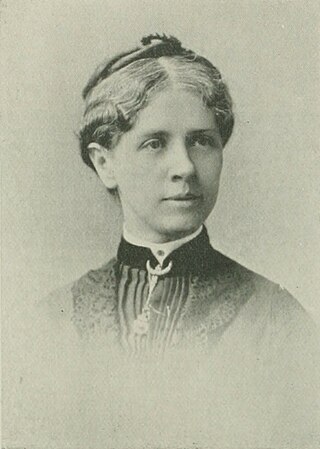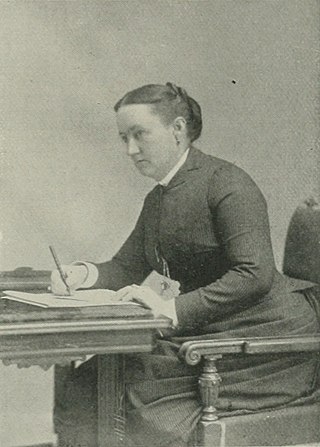
Lucy Wheelock was an American early childhood education pioneer within the American kindergarten movement. She began her career by teaching the kindergarten program at Chauncy-Hall School (1879–89). Wheelock was the founder and head of Wheelock Kindergarten Training School, which later became Wheelock College in Boston, Massachusetts, and is now the namesake of Boston University's college of education BU Wheelock. She wrote, lectured, and translated on subjects related to education.

Lilian Whiting was an American journalist, editor, and author of poetry and short stories. She served as literary editor of the Boston Evening Traveller (1880–1890), editor-in-chief of the Boston Budget (1890–93), and afterward, spent much of her time in Europe. Whiting was the author of The World Beautiful, From Dreamland Sent, a book of poems, A Study of the Life and Poetry of Elizabeth Barrett Browning, A Record of Kate Field, The World Beautiful in Books, Boston Days, Florence of Landor, The Outlook Beautiful, Italy, the Magic Land, Paris the Beautiful, and others.

The Truth Seeker is an American periodical published since 1873. It was considered the most influential Freethought publication during the period following the Civil War into the first decades of the 20th century, known as the Golden Age of Freethought. Though there were other influential Freethought periodicals, Truth Seeker was the only one with a national circulation. The headquarters is in San Diego, California. The Truth Seeker is the world’s oldest freethought publication, and one of the oldest periodicals in America. Among general-readership titles, only Harper’s Magazine, The Atlantic, Scientific American, and The Nation are older.

Mary Hannah Gray Clarke was an American author, correspondent, and poet from Rhode Island. She wrote extensively for magazines and for the public press, and was also the author of many dramas, lyric poems, operettas, stories for the young, and essays. In addition to the operettas, "Just Like Cinderella" and "Jack Frost's Visit to the Fairies", her works included "Effle, Fairy Queen of Dolls," "Prince Pussin-Boots," "Golden Hair and her Knight of the Beanstalk in the Enchanted Forest," "Obed Owler and the Prize Writers," "How I Came to Leave Town and What Came of It," "Edith Morton, the Sensible Young Lady;" "The Story that the Willow Basket Told to Faith Fairchild;" "English Lyrics;" and "Home;" as well as a number of songs, such as "Were it not for Dreams;" ; "Twittering Swallow;" "Robin, Robin, Bold and Free;" "Down by the River;" "Not to Blame;" and "Our-Leafed Clover."

Helen M. Winslow was an American editor, author, publisher, and journalist. She began her work on Boston papers. Winslow served as dramatic editor on The Beacon, 1891–97; editor, Woman's Club Department, Boston Transcript, 1893–98; editor, Woman's Club Department of the Delineator, 1897, and again 1912; editor and publisher, The Club Woman, 1897-1904; and she was the publisher of the Official Register of Women's Clubs in America from 1897. She was the author of Salome Sheppard, Reformer. 1893; Concerning Cats, 1900; Concerning Polly, 1902; Literary Boston or To-day, 1902; The Woman of To-morrow, 1905; The President of Quex, 1906; Peggy at Spinster Farm, 1908; A Woman for Mayor, 1910; The Pleasuring of Susan Smith, 1912; and At the Sign of the Town Pump, 1913. She collaborated with Frances Willard in Occupations for Women, and with Marie Wright in Picturesque Mexico.

Luella Dowd Smith was an American educator and author of prose and verse. She was active in social reform movements of the day. Smith taught school for ten years and was the principal of three high schools and one academy. She was also active in the areas of temperance, Sunday school, prohibition, and equal suffrage. Smith wrote for the National Temperance Society. She was the author of Wayside Leaves, 1879; Wind Flowers, 1887; Flowers from Foreign Fields, 1895; The Value of the Church, 1898; Thirteen Temperance Theses and Two Trilogies, 1901; as well as Ways to win, 1904; Daily ideas and ideals, 1930; and Along the way; poems, 1938.

Euphemia Wilson Pitblado was a Scottish-born American women's activist, social reformer, and writer. She traveled in Europe, Canada, and in the United States, crossing the Atlantic five times. Pitblado was a delegate to the National Woman Suffrage Association Convention in Washington, D.C., the New England Woman's Suffrage Association Conventions, the National Woman's Christian Temperance Union (WCTU) Conventions in New York City, Denver, and Chicago, and to the annual Woman's Foreign Missionary Conventions in Boston and Lowell, Massachusetts. Her principal literary works were addresses upon temperance, suffrage, missions, education, and religion.

Katharine O'Mahoney was an Irish-born American educator, lecturer, and writer. A teacher of poetry to Robert Frost, she was the author of Famous Irishwomen (1907). O'Mahoney was one of the first Catholic women in New England, if not in the United States, to speak in public from the platform. Among her lectures may be mentioned "A Trip to Ireland" (illustrated); "Religion and Patriotism in English and Irish History" (illustrated); "Mary, Queen of Scots", and "Joan of Arc" ; "An Evening with Milton, including recitations from Paradise Lost", illustrated with fifty views from Dore; "An Evening with Dante, including recitations from the Divine Comedy", illustrated by seventy-six views from Dore; and "The Passion Play of Oberammergau". She founded, and until marriage, edited and published The Sunday Register.

Adelaide Avery Claflin was an American woman suffragist and ordained minister.

Clara Cleghorn Hoffman was an American educator and temperance reformer. She became identified with the white-ribbon movement in Kansas City, Missouri, giving up her position as principal of a school to enter the work of the Woman's Christian Temperance Union (WCTU). She served as President of the Missouri WCTU for 25 years. Within the National WCTU, she lectured across the U.S, was chosen Assistant Recording Secretary, and Recording Secretary, succeeding Lillian M. N. Stevens.

Anna Christy Fall was an American lawyer. She was the "first woman lawyer in Massachusetts to plead a case before a jury and the first to argue before the Massachusetts Supreme Court".

Martha E. Sewall Curtis was an American woman suffragist and writer. She delivered notable lectures at the meetings of the National Woman Suffrage Association in Boston. For years, she edited a weekly woman's column in the News, of Woburn, Massachusetts, and was president of the Woburn Equal Suffrage League. For a number of years, she conducted in Boston a bureau of stenography and employed about 20 women. Her publications included Burlington Church (1885), Burlington (1890), and Ye olde meeting house (1909).

Sue A. Sanders was an American teacher, clubwoman, and author, who was prominent in social circles. She was a leader in charitable organizations serving as the ninth National President of the Woman's Relief Corps (WRC). Sanders was the originator of placing a flag in every school house, hers the first school to have a flag in McLean County, Illinois. Sanders was also the author of A journey to on and from the "golden shore" (1887).

Emily Lee Sherwood Ragan was an American author and journalist. She was engaged in journalism in Washington, D.C., 1888–1900, and was also a contributor to other papers and magazines. By 1899, she engaged as special writer and searcher of Library of Congress. Ragan served as press superintendent of the Woman's Christian Temperance Union (WCTU) of D. C.; and president of the board of directors of the Women's Clinic. Ragan was a charter member of the National Society of the Daughters of the American Revolution (D.A.R.); and was the corresponding secretary for eighteen years of the Woman's Universalist Missionary Society, then known as Women's Centenary Association. Ragan favored woman suffrage. She was the author of Willis Peyton's Inheritance, 1889; and collaborator with Mary Smith Lockwood in preparing and publishing The Story of the Records.

Alice Ives Breed was an American social leader, salonnière, and clubwoman. She excelled as an organizer, using her executive abilities in religious, philanthropic, literary and social channels, aiming to improve the community.
Martha Violet Ball was a 19th-century American educator, philanthropist, activist, writer, and editor. Ball and her sister, Lucy, undertook the work of opening a school for young African American girls in the West End of Boston. In the same year, 1833, she assisted in the organization of the Boston Female Anti-Slavery Society, of which she and Lucy held leadership roles. Her work among unfortunate women and girls led to the formation of the New England Female Moral Reform Society, with which she was from its beginning connected as Secretary and Manager. For twenty-five years, she was joint-editor of its organ, the Home Guardian, and was also affiliated in its department, "The Children's Fireside". She was a constituent member of the Ladies' Baptist Bethel Society, first as its Secretary and for thirty years its President. Ball was the first President of the Woman's Union Missionary Society of America for Heathen Lands, and a charter member of the New England Woman's Press Association. She was the author of several small, popular books.

Minerva Brace Norton was an American educator and writer. She was from her early youth until her last days a constant contributor to periodical literature. For most of her life, she also filled the role of a pastor's wife.

Grace A. Oliver was a 19th-century American author, litterateur, and advocate for women's rights. She was characterized as a woman of rare executive ability, a good speaker, and was noted for her charity work.

Jean Brooks Greenleaf was an American woman suffragist. With her death in 1918, there passed the last of a small group of devoted suffragists who received their first inspiration from Susan B. and Mary Anthony. Greenleaf was the only one of the women who saw their goal come true in New York, the state where they had lived the greater share of their lives.

Lettie S. Bigelow was an American poet and author of the long nineteenth century. She was affiliated with the Woman's Christian Temperance Union (W.C.T.U.) in Massachusetts.




















